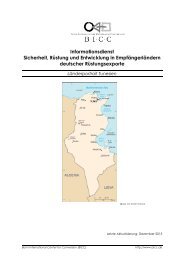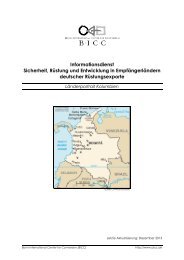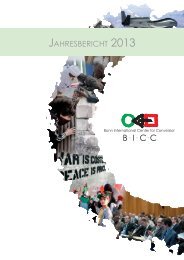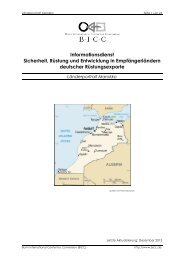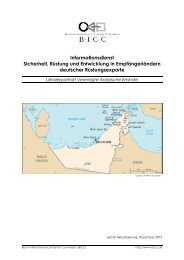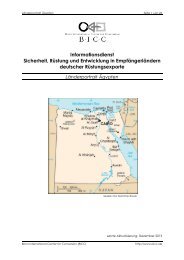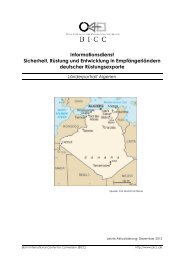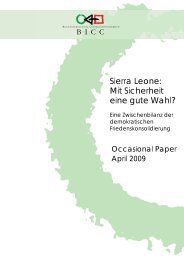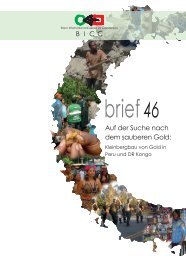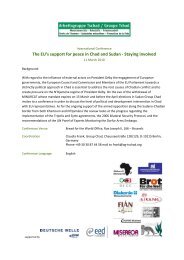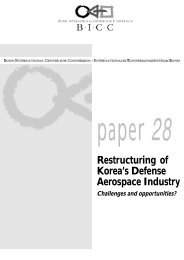English - BICC
English - BICC
English - BICC
You also want an ePaper? Increase the reach of your titles
YUMPU automatically turns print PDFs into web optimized ePapers that Google loves.
ief 22<br />
reintegrate former combatants, has<br />
customarily been treated as an<br />
important issue, but the heightened<br />
status it has received in Northern<br />
Ireland, where it became the core issue<br />
of dispute between rival sectarian<br />
groups during an eight-year period, is<br />
virtually unprecedented. “The success<br />
of any decommissioning scheme, as<br />
evident from examples of conflict<br />
resolution in Angola, Cambodia, El<br />
Salvador, Lebanon, Mozambique,<br />
Nicaragua and Panama, depends on a<br />
variety of factors, including the<br />
recognition that debates on<br />
disarmament and demobilisation<br />
should be prevented from becoming<br />
too highly politicised” (Schulze and<br />
Smith, 2000, p.83).<br />
The missing link of<br />
decommissioning<br />
mindsets<br />
How can the specific problems of<br />
Northern Ireland, relating to the issue<br />
of taking guns out of politics, be<br />
explained? One may indeed argue that<br />
the discussions about decommissioning<br />
in Northern Ireland have been heavily<br />
politicised. But what does this imply?<br />
Protagonists on both sides of the<br />
sectarian divide tended to overload the<br />
issue of weaponry with the political<br />
Almost three hours after the IRA had<br />
announced that it had put some arms<br />
beyond use, the Independent International<br />
Commission on<br />
Decommissioning (IICD) issued a<br />
short statement confirming the IRA’s<br />
move:<br />
1) On 6 August 2001 the Commission<br />
reported that agreement had been<br />
reached with the IRA on a method<br />
to put IRA arms completely and<br />
verifiably beyond use. This would be<br />
done in such a way as to involve no<br />
symbolism of the thirty years of<br />
suffering and tumult that comprised<br />
the Troubles, thereby making it more<br />
difficult to disarm. Partisan attitudes<br />
towards both perceptions of security<br />
and the legitimacy of political change<br />
have been reflected through the arms<br />
issue. For the Unionists it functioned<br />
as a scapegoat issue that they exploited<br />
to apply pressure on the Republicans<br />
and to compensate for political<br />
setbacks and failures incurred on other<br />
issues; for Republicans, it served as a<br />
bargaining tool to press for political<br />
concessions. Since the inauguration of<br />
the peace process in 1994, the<br />
positions on decommissioning<br />
espoused by the two main conflicting<br />
parties clearly conveyed their deep<br />
rooted mutual distrust: Unionists held<br />
decommissioning as the essential factor<br />
underpinning their resentment of a<br />
power-sharing government in which<br />
they were forced to legislate alongside a<br />
party linked to private army;<br />
Republicans argued with great<br />
vehemence that arms had never been<br />
handed over in the long history of the<br />
Irish armed struggle. “The issue<br />
became a metaphor for basic positions<br />
on the peace process and attitudes<br />
towards political opponents…a symbol<br />
for the limits of surrender of both<br />
sides” (Mac Ginty and Darby, 2002, p.<br />
105).<br />
risk to the public and avoid the<br />
possibility of misappropriation by<br />
others.<br />
2) We have now witnessed an event<br />
which we regard as significant in<br />
which the IRA has put a quantity of<br />
arms completely beyond use. The<br />
material in question includes arms,<br />
ammunition and explosives.<br />
3) We are satisfied that the arms in<br />
question have been dealt with in<br />
accordance with the scheme and<br />
regulations. We are also satisfied that<br />
52 B·I·C·C<br />
Making the well being of the whole<br />
process dependent on the success of<br />
decommissioning did not contribute to<br />
the central overall requirement of<br />
building a stable peace. For the<br />
Unionists, staking everything on that<br />
one card which they could not properly<br />
play, and thereby pushing the<br />
Republicans in the most painful corner,<br />
may in retrospect not have been a very<br />
wise tactic. We agree though with the<br />
assumption made by Mac Ginty and<br />
Darby (ibid.) that if decommissioning<br />
had been resolved other issues of<br />
security concern such as policing<br />
reform or demilitarisation would have<br />
likely assumed an air of intractability<br />
and created a new impasse. Why, in an<br />
attempt to break the deadlock of<br />
decommissioning, issues of similar<br />
security concern became more closely<br />
linked, will be discussed among the<br />
themes below.<br />
Behind the debate about how and<br />
when to disarm the “hardware” of civil<br />
strife, much more complex problems<br />
of how to decommission the mindsets<br />
of the main players come to light.<br />
Decommissioning efforts in Northern<br />
Ireland became almost<br />
indistinguishable from efforts to<br />
discover ways out of the historically<br />
deep-rooted sectarianism that remains<br />
the main obstacle to non-violent<br />
Box F: Report of the International Independent Commission on<br />
Decommissioning, 23 October 2001<br />
it would not further the process of<br />
putting all arms beyond use were we<br />
to provide further details of this<br />
event.<br />
4) We will continue our contact with<br />
the IRA representative in pursuit of<br />
our mandate.<br />
Source: BBC News, 23 October 2001,<br />
http://news.bbc.co.uk/hi/english/uk/<br />
northern_ireland/newsid_1615000/<br />
1615957.stm.



